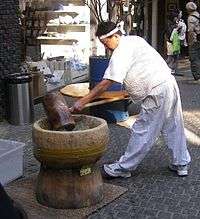Jeolgu
| Jeolgu and gongi | |
_and_gongi_(pestle).jpg) Wooden jeolgu (mortar) and gongi (pestle) | |
| Hangul | 절구 |
|---|---|
| Revised Romanization | jeolgu |
| McCune–Reischauer | chŏlgu |
| IPA | [tɕʌl.ɡu] |
| Hangul | 공이 |
| Revised Romanization | gongi |
| McCune–Reischauer | kong'i |
| IPA | [koŋ.i] |
Jeolgu (절구) and gongi (공이) are a type of traditional Korean mortar and pestle set, used for pounding grains or tteok (rice cake).[1][2][3] They can be made with timber, stone, or iron.[2] Jeolgu is a bowl-shaped vessel in which grains or tteok can be pounded, and gongi refers to either a pestle for a mortar or a stamper for a stamp mill.[3]
Gallery
See also
- Usu, Japanese equivalent of jeolgu
References
- ↑ Paek, Doo-hyeon (2010). "P'yŏngan Dialect and Regional Identity in Chŏsŏn Korea". In Kim, Sun Joo. The Northern Region of Korea: History, Identity, and Culture. Seattle, WA: Center for Korea Studies Publications, University of Washington Press. p. 125. ISBN 978-0-295-99041-5.
- 1 2 "jeolgu" 절구. Standard Korean Language Dictionary (in Korean). National Institute of Korean Language. Retrieved 23 May 2017.
- 1 2 "gongi" 공이. Standard Korean Language Dictionary (in Korean). National Institute of Korean Language. Retrieved 23 May 2017.
This article is issued from
Wikipedia.
The text is licensed under Creative Commons - Attribution - Sharealike.
Additional terms may apply for the media files.
